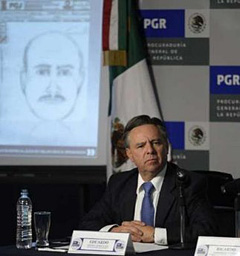
|  |  |  News Around the Republic of Mexico | November 2008 News Around the Republic of Mexico | November 2008  
Mexico to Try Suspects as Terrorists for Explosion
 Associated Press Associated Press
go to original


| | Mexico's Attorney General Eduardo Medina Mora attends a news conference in Mexico City November 4, 2008. (Reuters/Daniel Aguilar) | | |
Mexico City - Mexican authorities announced Tuesday that they have charged three alleged drug hit men with terrorism for throwing grenades into crowds of Independence Day revelers, an unprecedented attack on civilians that killed eight people and wounded 106.

The men — suspected members of a group of Gulf Cartel hit men known as the Zetas — have also been charged with organized crime, homicide, illegal arms possession and causing bodily harm, said Mexican Attorney General Eduardo Medina Mora.

Medina Mora said Julio Cesar Mondragon, Juan Carlos Castro and Alfredo Rosas confessed to the Sept. 15 attacks in the colonial capital of Morelia in Michoacan state. The suspects' relatives contend the men were tortured into confessing.

In a video distributed by prosecutors days after the attack, Castro tells an investigator their aim was "to frighten and provoke the government."

Medina Mora said that three other Gulf cartel members are being sought for planning the attacks.

Thousands of people were packed into the city's square to celebrate the anniversary of Mexico's war of independence when two grenades exploded within blocks of each other, killing eight, including a 13-year-old boy, and wounding 106, many of them children.

Medina Mora said his office has surveillance video that shows the suspects at Morelia's plaza on Sept. 15.

But the defendants' wives told a news conference Tuesday that their husbands were in the port city of Lazaro Cardenas, 250 miles south of Morelia, the day of the attacks and that they had been kidnapped and tortured into confessing by unknown gunmen who then turned them over to authorities.

The women said the kidnappers beat their spouses up, handcuffed them, tied their legs, blindfolded them and left them in a house in Apatzingan, a city roughly midway between Morelia and Lazaro Cardenas. An anonymous call led federal investigators to the house, where the three were arrested.

"He gave his testimony under physical and psychological torture," said Castro's wife, Esperanza Fajardo. "They don't have any other proof but a confession they pulled out of him with torture."

Anti-terrorism prosecutor Ricardo Cabrera confirmed the suspects were found handcuffed. Cabrera said the suspects' told investigators that cartel members had cuffed them because they wanted to leave the gang.

They said "they felt bad after hearing what they had done to those people and other gang members considered them a risk to the organization," Cabrera said.

Two days after the grenade attack, the government said it suspected La Familia, a ruthless gang that emerged a few years ago in the battle for control of Michoacan. But the next day, banners appeared in the city of Morelia allegedly signed by La Familia and blaming the Zetas. Prosecutors later said both gangs were being investigated in the attack.

Mexico's major drug gangs are fighting for control of lucrative smuggling routes in Michoacan, President Felipe Calderon's home state, which includes Lazaro Cardenas, a large seaport, and Morelia.

The fighting has made the state one of the most violent in Mexico, with frequent shootouts and gruesome decapitations. It was the first place Calderon sent federal troops after he took office in December 2006. |

 |
|  |



